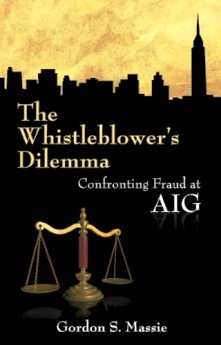Historically, the term applied to a Chinese painkiller originally derived from the skin of Chinese water snakes. Due to the lack of efficacy, however, the expression quickly became code for any fraudulent product.

But the vital ingredient in snake oil was not in the bottle but out of the mouth of the salesman who would breeze into a town, fast-talk and sell his fakery, then high-tail it out of town before the scheme was ultimately discovered.
In the high-finance world of the 80s, “junk bonds” became the new snake oil and Michael Milken was its most visable salesman. Sadly, as the recent financial collapse has proven, there was no shortage of Milkens lurking in companies from Enron to Lehman Brothers to AIG.
In a new book, The Whistleblower’s Dilemma – Confronting Fraud at AIG, Gordon Massie details his own personal (and ethical) nightmare after the company he worked for, American General Corporation, was purchased by the insurance giant.
“Until the mid-1980s,” Massie writes, “The term ‘junk bond’ referred to that rare investment-grade bond that the rating agencies had demoted to below investment grade…. [Soon] They had become the tools of corporate raiders, endorsed by Michael Milken and his evil empire at the investment banking firm of Drexel Burnham Lambert.
“But it wasn’t’ just Drexel. The other major investment banks at the time, such as First Boston, Morgan Stanley, and Goldman Sachs, etc. were all seeing Drexel’s early successes in this game and several chose to vigorously compete since the investment banking fees were enormous.”
In what, at times, reads like a vast Shakespearean tragedy, Massie takes us along a path in which many at AIG had to choose between common sense and the chance for unbelievable riches. Unfortunately, far too many chose the later at a cost to millions who are still suffering.
I met Gordon Massie through Jeff Wigand, the tobacco insider, about a year ago. In the first of several phone conversations, Gordon detailed some of his experiences at AIG, most involved witnessing many throwing common, financial sense out the window in favor of prospective high profits.
As soon as Gordon met Milken at a conference in Los Angeles, it didn’t take long for the man who spent years in the investment business to smell the snake oil.
“Milken was normally surrounded by an entourage of admirers, but I walked up to him… during a rare moment of solitude…. I remembered my father’s advice… ‘When you meet someone for the first time, make sure you look them in the eye. And give ‘em an extra firm handshake.’ Milken had apparently not mastered either concept…. The entire purpose of this conference was to sell us the unquestioned virtues of high-yield bonds and of Drexel Burnham in particular – and I was less than totally sold.”
This was just the tip of the iceberg of what would ultimately lead to a financial meltdown of Biblical proportions.
Not experienced enough to read about the complex world of high-finance? Yeah, me too, but Massie doesn’t write in technical terms. Rather he takes us through his personal journey explaining in common sense language (there’s the expression, again) the players, investment strategies and what it all meant in terms of the disaster to come.
On AIG CEO Hank Greenberg, “Greenberg took his nickname from ‘Hammerin’ Hank’ Greenberg, star slugger for the Detroit Tigers… Hank thought nothing of telling his colleagues what goddam fools they were, or of belittling their grasp of the insurance business, which he almost always understood better than they did.”
After coming to AIG, one of Massie’s first duties was to take a hard look at AIG’s Sun portfolio, which was “God-awful!! A typical position was a $50 million par value holding of the unsecured, subordinated debt in a bankrupt telecommunications start-up company…. What were these people thinking?… Where was the credit analysis? Where was the risk analysis? Where was the management supervision?”
When Massie proposes to sell off the bad holdings, he’s met with resistance.
“The principal obstacle to this ‘sell all’ approach was that AIG did not want to take (realize) the losses. If an insurance company sells a bond at a loss,” Massie explains, “they record that loss through the income statement as an Investment Loss. If, instead, they continue to hold that bond, which is trading below their cost, they do not have to report any investment loss on their income statement, unless the bond is considered to be ‘permanently impaired’ or never to recover full value in the future.
“…bonds will be subject to a permanent impairment write-down (usually to the current market value) and that write-down or loss will flow through the holder’s income statement even though the bonds have not been sold.”
But AIG did not want to take the write-downs because that would, of course, negatively affect the income statement.
“Another explanation given to me as to why these write-downs need not be taken was that AIG had substantial gains elsewhere in its common stock, private equity, and hedge fund portfolios which had not yet been realized. My reaction, ‘well that’s fine except those are not the accounting rules.’ Private equity, hedge fund, and common stock gains are subject to their own specific accounting rules which are totally independent to the accounting rules applicable to bond losses. AIG can’t just arbitrarily decide the accounting rules it wants to use. This was accounting fraud.”
Welcome to the new snake oil.
More to come.
Comments









